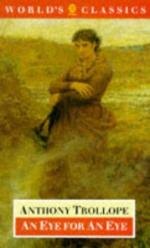But when Lord Neville died, it was necessary that the old man should think of his new heir. Alas; in that family, though there was much that was good and noble, there had ever been intestine feuds,—causes of quarrel in which each party would be sure that he was right. They were a people who thought much of the church, who were good to the poor, who strove to be noble;—but they could not forgive injuries. They could not forgive even when there were no injuries. The present Earl had quarrelled with his brother in early life;—and had therefore quarrelled with all that had belonged to the brother. The brother was now gone, leaving two sons behind him,—two young Nevilles, Fred and Jack, of whom Fred, the eldest, was now the heir. It was at last settled that Fred should be sent for to Scroope Manor. Fred came, being at that time a lieutenant in a cavalry regiment,—a fine handsome youth of five and twenty, with the Neville eyes and Neville finely cut features. Kindly letters passed between the widowed mother and the present Lady Scroope; and it was decided at last, at his own request, that he should remain one year longer in the army, and then be installed as the eldest son at Scroope Manor. Again the lawyer was told to do what was proper in regard to money.
A few words more must be said of Lady Scroope, and then the preface to our story will be over. She too was an Earl’s daughter, and had been much loved by our Earl’s first wife. Lady Scroope had been the elder by ten years; but yet they had been dear friends, and Lady Mary Wycombe had passed many months of her early life amidst the gloom of the great rooms at Scroope Manor. She had thus known the Earl well before she consented to marry him. She had never possessed beauty,—and hardly grace. She was strong featured, tall, with pride clearly written in her face. A reader of faces would have declared at once that she was proud of the blood which ran in her veins. She was very proud of her blood, and did in truth believe that noble birth was a greater gift than any wealth. She was thoroughly able to look down upon a parvenu millionaire,—to look down upon such a one and not to pretend to despise him. When the Earl’s letter came to her asking her to share his gloom, she was as poor as Charity,—dependent on a poor brother who hated the burden of such claim. But she would have wedded no commoner, let his wealth and age have been as they might. She knew Lord Scroope’s age, and she knew the gloom of Scroope Manor;—and she became his wife. To her of course was told the story of the heir’s marriage, and she knew that she could expect no light, no joy in the old house from the scions of the rising family. But now all this was changed, and it might be that she could take the new heir to her heart.
CHAPTER II.
Fred Neville.




